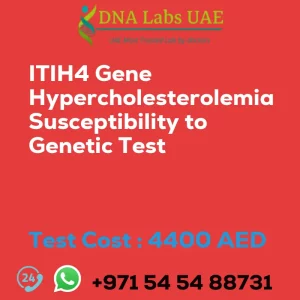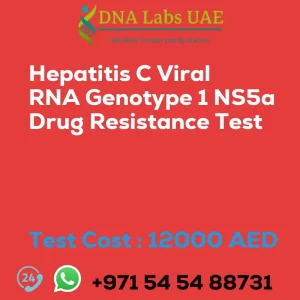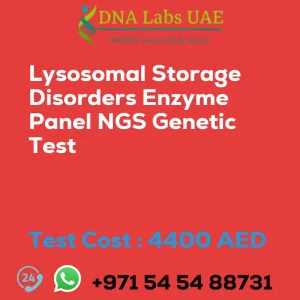AGXT Gene Hyperoxaluria type 1 Genetic Test
Components
- Test Name: AGXT Gene Hyperoxaluria type 1 Genetic Test
- Price: 4400.0 AED
- Sample Condition: Blood
- Report Delivery: 3 to 4 Weeks
- Method: NGS Technology
- Test type: Metabolic Disorders
- Doctor: General Physician
- Test Department: Genetics
Pre Test Information
Clinical History of Patient who is going for AGXT Gene Hyperoxaluria type 1 NGS Genetic DNA Test A Genetic Counselling session to draw a pedigree chart of family members affected with Hyperoxaluria type 1
Test Details
The AGXT gene is associated with a condition called primary hyperoxaluria type 1 (PH1), which is a rare genetic disorder characterized by the overproduction of a substance called oxalate. This excess oxalate can build up in the kidneys and other organs, leading to the formation of kidney stones, kidney damage, and potentially life-threatening complications.
NGS (Next-Generation Sequencing) genetic testing is a method used to analyze an individual’s DNA for specific genetic variations or mutations. In the case of AGXT gene hyperoxaluria type 1, NGS genetic testing can be used to identify mutations in the AGXT gene that are associated with PH1. NGS genetic testing for AGXT gene hyperoxaluria type 1 involves sequencing the entire AGXT gene or specific regions of interest to identify any genetic variations or mutations that may be present. This can help to confirm a diagnosis of PH1 in individuals with suspected or confirmed symptoms of the condition.
Genetic testing for AGXT gene hyperoxaluria type 1 can be helpful in several ways. It can aid in the diagnosis of the condition, particularly in cases where the symptoms are atypical or unclear. It can also provide information about the specific genetic mutations present, which can be useful for predicting disease severity, guiding treatment decisions, and informing genetic counseling for affected individuals and their families.
It is important to note that NGS genetic testing for AGXT gene hyperoxaluria type 1 is typically ordered by a healthcare professional, such as a geneticist or nephrologist, who specializes in the diagnosis and management of genetic disorders. The test may involve collecting a blood or saliva sample from the individual, which is then sent to a specialized laboratory for analysis.
Overall, NGS genetic testing for AGXT gene hyperoxaluria type 1 is a valuable tool for diagnosing and managing this rare genetic disorder, providing important information for individuals and their healthcare providers.
| Test Name | AGXT Gene Hyperoxaluria type 1 Genetic Test |
|---|---|
| Components | |
| Price | 4400.0 AED |
| Sample Condition | Blood |
| Report Delivery | 3 to 4 Weeks |
| Method | NGS Technology |
| Test type | Metabolic Disorders |
| Doctor | General Physician |
| Test Department: | Genetics |
| Pre Test Information | Clinical History of Patient who is going for AGXT Gene Hyperoxaluria type 1 NGS Genetic DNA Test A Genetic Counselling session to draw a pedigree chart of family members affected with Hyperoxaluria type 1 |
| Test Details |
The AGXT gene is associated with a condition called primary hyperoxaluria type 1 (PH1), which is a rare genetic disorder characterized by the overproduction of a substance called oxalate. This excess oxalate can build up in the kidneys and other organs, leading to the formation of kidney stones, kidney damage, and potentially life-threatening complications. NGS (Next-Generation Sequencing) genetic testing is a method used to analyze an individual’s DNA for specific genetic variations or mutations. In the case of AGXT gene hyperoxaluria type 1, NGS genetic testing can be used to identify mutations in the AGXT gene that are associated with PH1. NGS genetic testing for AGXT gene hyperoxaluria type 1 involves sequencing the entire AGXT gene or specific regions of interest to identify any genetic variations or mutations that may be present. This can help to confirm a diagnosis of PH1 in individuals with suspected or confirmed symptoms of the condition. Genetic testing for AGXT gene hyperoxaluria type 1 can be helpful in several ways. It can aid in the diagnosis of the condition, particularly in cases where the symptoms are atypical or unclear. It can also provide information about the specific genetic mutations present, which can be useful for predicting disease severity, guiding treatment decisions, and informing genetic counseling for affected individuals and their families. It is important to note that NGS genetic testing for AGXT gene hyperoxaluria type 1 is typically ordered by a healthcare professional, such as a geneticist or nephrologist, who specializes in the diagnosis and management of genetic disorders. The test may involve collecting a blood or saliva sample from the individual, which is then sent to a specialized laboratory for analysis. Overall, NGS genetic testing for AGXT gene hyperoxaluria type 1 is a valuable tool for diagnosing and managing this rare genetic disorder, providing important information for individuals and their healthcare providers. |








